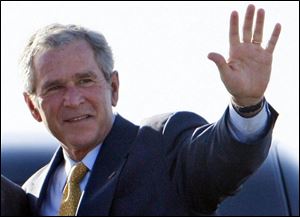
Bush keeping Iraq troop levels mostly steady
9/9/2008 Bush speech on Iraq troop withdrawal (Live at 9:55 a.m.)
" rel="storyimage1" title="George-W-Bush-John-McCain.jpg"/>
Bush speech on Iraq troop withdrawal (Live at 9:55 a.m.)
" rel="storyimage1" title="George-W-Bush-John-McCain.jpg"/>
<br> <img src=http://www.toledoblade.com/graphics/icons/video.gif> <b><font color=red>VIDEO</b></font color=red>: <a href=" http://video.ap.org/vws/search/aspx/ap.aspx?g=live_event_two&f=OHTOL" target="_blank "><b>Bush speech on Iraq troop withdrawal</b></a> <b><font color=red>(Live at 9:55 a.m.)</b></font color=red>
WASHINGTON - President Bush on Tuesday plans to order 8,000 more combat and support troops out of Iraq by February, a measured drawdown that will leave nearly the same level of U.S. forces in the war zone for the rest of the year.
Bush's decision, to be delivered in a speech Tuesday, is perhaps his final stamp on the war that has defined his presidency. The scope and pace of the U.S. troop withdrawals are smaller than long anticipated, reflecting a desire by the military and the president not to jeopardize security gains in Iraq.
By the time the troops return home on the timeline Bush is proposing, someone else will be making the wartime decisions from the Oval Office.
There are about 146,000 U.S. troops in Iraq. Bush hinted that more troops could return to the U.S. in the first half of 2009 if conditions improve.
"Here is the bottom line: While the enemy in Iraq is still dangerous, we have seized the offensive, and Iraqi forces are becomingly increasingly capable of leading and winning the fight," Bush said in remarks prepared for delivery to the National Defense University in Washington.
The White House released the text of his speech in advance.
The decisions show that Bush still commands when and how troops will withdraw, despite a Congress that fiercely opposes him and a soured American public.
Senate Majority Leader Harry Reid said Tuesday, "I am stunned that President Bush has decided to bring so few troops home from Iraq and send so few resources to Afghanistan."
Reid, D-Nev., said, "As Democrats have been saying for years and as I saw with my own eyes last month, violence in Afghanistan has surged because Bush-McCain Republicans have all but ignored the true central front of the war on terror while keeping the bulk of our troops tied down in Iraq."
In all, about 8,000 U.S. forces will be coming back, the president said.
One Marine battalion, numbering about 1,000 troops, will go home on schedule in November and not be replaced. An Army brigade of between 3,500 and 4,000 troops will leave in February. Accompanying that combat drawdown will be the withdrawal of about 3,400 support forces over next several months.
Senior defense officials say Bush is adopting a compromise from his military team.
Gen. David Petraeus, the top U.S. commander in Iraq, had argued to keep troop levels fairly level through next June, an even longer time frame than Bush is embracing. But others, including Adm. Mike Mullen, chairman of the Joint Chiefs of Staff, said they believed that withdrawing troops more quickly from Iraq represented a small risk compared to the gain that could be made by shifting more to Afghanistan.
Anthony Cordesman, an Iraq expert at the Center for Strategic and International Studies, said the emerging plan reflects the concern of U.S. commanders: Rushing U.S. force reductions could lead to instability at a pivotal time for Iraqi political progress and preparedness of Iraqi forces.
"This plan does, however, mean continuing stress on both the active and reserve forces," Cordesman added.
Democratic presidential nominee Barack Obama has advocated pulling all U.S. combat forces out of Iraqi within 16 months of taking office. GOP nominee John McCain has said he would rely on the advice of U.S. military commanders to determine the timing and pace of troop reductions.
Both candidates have said more troops are needed in Afghanistan, where there has been a resurgence of the Taliban and a growth in violence.
Bush argued that Iraq is in a better place now by almost any measure. He said violence is at its lowest point since the spring of 2004, "normal life is returning to communities across the country," and political reconciliation is moving forward.
Bush was planning a low-key trip to Walter Reed Army Medical Center Tuesday afternoon to visit wounded troops.
More than half of Bush's address is devoted to Afghanistan. He outlined what he called a "quiet surge" of additional American forces there, bringing the U.S. presence to nearly 31,000.
"For all the good work we have done in that country, it is clear we must do even more," the president said.
He announced that a Marine battalion that had been scheduled to go to Iraq in November would go to Afghanistan instead, and that would be followed by one Army combat brigade.